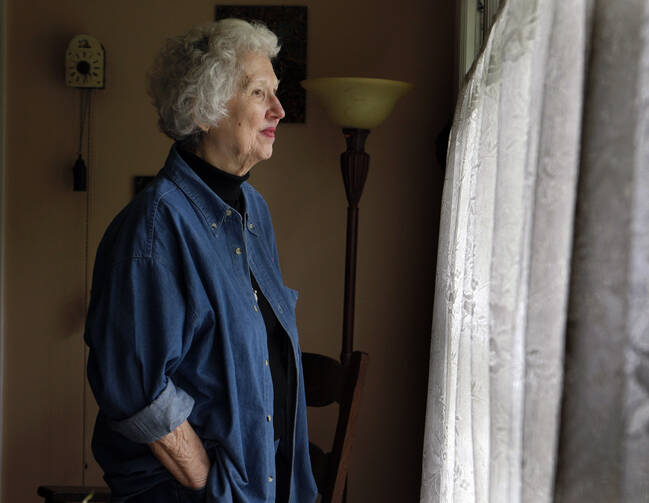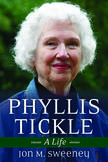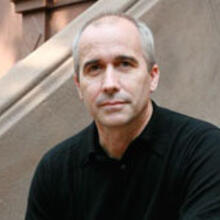“She was earthy and ethereal”: remembering Phyllis Tickle
The last time I saw Phyllis Tickle was on a lovely spring day in 2015, when I spent several precious hours with her as she spoke publicly (and poignantly) for the first time about the lung cancer that would claim her life a few months later. But before that happened I had to find her, and that meant wandering along country roads near her farm outside Memphis in an effort to reconcile Tickle’s blithely dispensed directions with the precise commands from an equally confident, but equally notional, navigational computer speaking from the dashboard of my rental car.
I called Tickle in exasperation as soon as a lucky turn produced a single signal bar on my cellphone. She assured me I would find her with no problem if I just kept going, and that I would recognize the place by the mad barking of the five stray dogs that her grown children dumped on her over the years. “I told them that if they give me one more damned dog, I swear I’ll take them out and shoot ’em all!” she said. She then rushed to assure me that I ought not to be put off by the canine dramatics. “They’ll raise holy hell,” she drawled. “But they’ve never bitten anybody.”
That was vintage Phyllis Tickle. Charitable, profane, folksy and with a sly touch of ambiguity: She didn’t say the dogs would not bite, she just said they hadn’t bitten anyone—yet. You were always taking your chances in life, and also with Phyllis, but you should enjoy the ride and be confident the risk was worth it. Probably.
It certainly was worth it that day, as she talked with typical wisdom and humor and insight about her life and impending death, about past projects and future plans that she knew she would not see completed. It was wonderful, yet painful, to be reminded of all that Phyllis Tickle had been and done in her 81 years: poet, educator, spiritual writer, chronicler of the pastoral life, acclaimed lecturer on religious trends, leading promoter of religious publishing—not to mention wife, mother and homemaker, whose pleasures around the farm included killing snakes, planting lettuce and belting out songs like Three Dog Night’s “Joy to the World.”
My story on our conversation for Religion News Service would only skim the surface of all she said that day, but one of the projects she was working on has now been completed and goes much deeper and wider than I could, and with greater grace and insight and storytelling skill. It is an authorized biography by Jon Sweeney, a veteran author and the editor in chief at Paraclete Press, that serves as an essential summation of Tickle’s multifaceted work. It is also a moving recounting—with occasional eye-opening revelations—of her remarkable life.
That is no easy task. Sweeney (full disclosure: he helped arrange my visit to the farm in Lucy, Tenn., in 2015) notes at the beginning of this volume that despite the millions of words that Tickle wrote and spoke, often about herself, there is much “deflection and indirection” in her work and she “excelled at philosophizing around emotional difficulty.”
Phyllis Tickle never gave up and never became cynical, even if she had plenty of reason for despair.
There were difficulties aplenty, and Phyllis Tickle: A Life catalogues those we knew, and some we did not, so that by the end you are even more impressed by Tickle’s determination, productivity, generosity and persistence in religious devotion and spiritual seeking. She never gave up and never became cynical, even if she had plenty of reason for despair.
Consider that she gave birth to seven children, one of whom died in infancy, and she endured at least that many miscarriages; the losses lacerated her heart and wounded her marriage to her high school sweetheart, Sam Tickle, a physician to whom she remained faithful even as he wandered religiously and sexually. After two decades of marriage, Sam confessed to her that he was bisexual, and he engaged in regular affairs with men. Phyllis made the best of it for the next 40 years, and even befriended many of his partners. But it was a searing pain all the same, one she kept secret the rest of her life.
Phyllis Tickle was also beset by illnesses, including a tick-borne disease that would sap her energy for much of her later life. A near-death experience at the birth of her first child was traumatic but also life-changing. It introduced this conservative Presbyterian daughter of the East Tennessee mountains to a mystical sensibility that never left her. Even as she pursued the life of the mind and constructed a career—no small feat in itself for a Southern woman in the 1950s—Tickle pursued spiritual fulfillment and truth relentlessly. That pursuit (along with the desire to find a spiritual home her husband would share) led her to any number of different churches and movements.
Even as she pursued the life of the mind and constructed a career, Tickle pursued spiritual fulfillment and truth relentlessly.
She eventually became a chief exponent and chronicler of what was called “emergent” Christianity. Yet her book The Divine Hours introduced countless readers to traditional fixed-hour prayer, and she herself migrated not to some nondenominational congregation but to the Episcopal Church.
She appreciated Anglicanism’s intellectual freedom and doctrinal development and became identified with theological liberals and gay-friendly theologians like John Shelby Spong, Brian McLaren and Marcus Borg. But she was also very rooted in Christianity’s core beliefs. “Phyllis never understood why being progressive had to mean throwing out every traditional aspect of faith,” Sweeney writes, “and she never really approved of the ways progressives replaced one set of certainties with another.”
Sweeney writes that a chief challenge of the biography was “to blend Phyllis’ life with her writings.” He is up to the challenge, which is why this volume is as valuable as it is readable. At the same time, something haunting emerges from the retelling of Tickle’s life. Here was a woman who was both spiritual and religious, doubting and faithful, progressive and traditional, honest yet secretive, earthy and ethereal, and someone who made a career out of the written and spoken word.
Will there ever be another Phyllis Tickle? Could there be?
Will there ever be another Phyllis Tickle? Could there be? Our lives have become so fragmented and polarized—not to mention the havoc that the internet and social media have wrought on publishing—that Tickle already seems like a relic of another age, though she has been gone less than three years. When I spoke with her she was still curious about the changes she knew were coming, and she clearly wanted to take a crack at guessing at what they might entail even as she knew she would likely never have the chance.
But she also seemed at peace knowing she would not live to see any more changes, or have to navigate the upheavals—for herself, or for an audience. She was ready to be done. “The dying is my next career,” she told me.
As I drove away that day, she stood on her porch and waved enthusiastically. “Traveling mercies!” she shouted. “We’ll meet again on the other side.”
This article also appeared in print, under the headline “She was earthy and ethereal,” in the March 5, 2018, issue.











